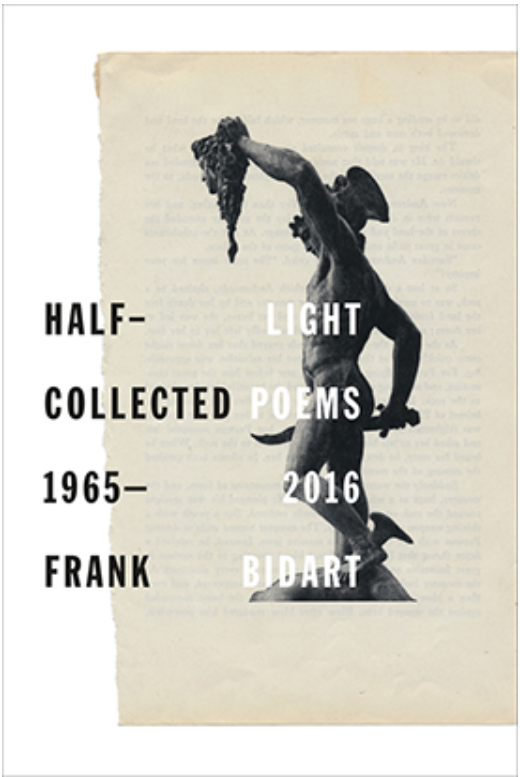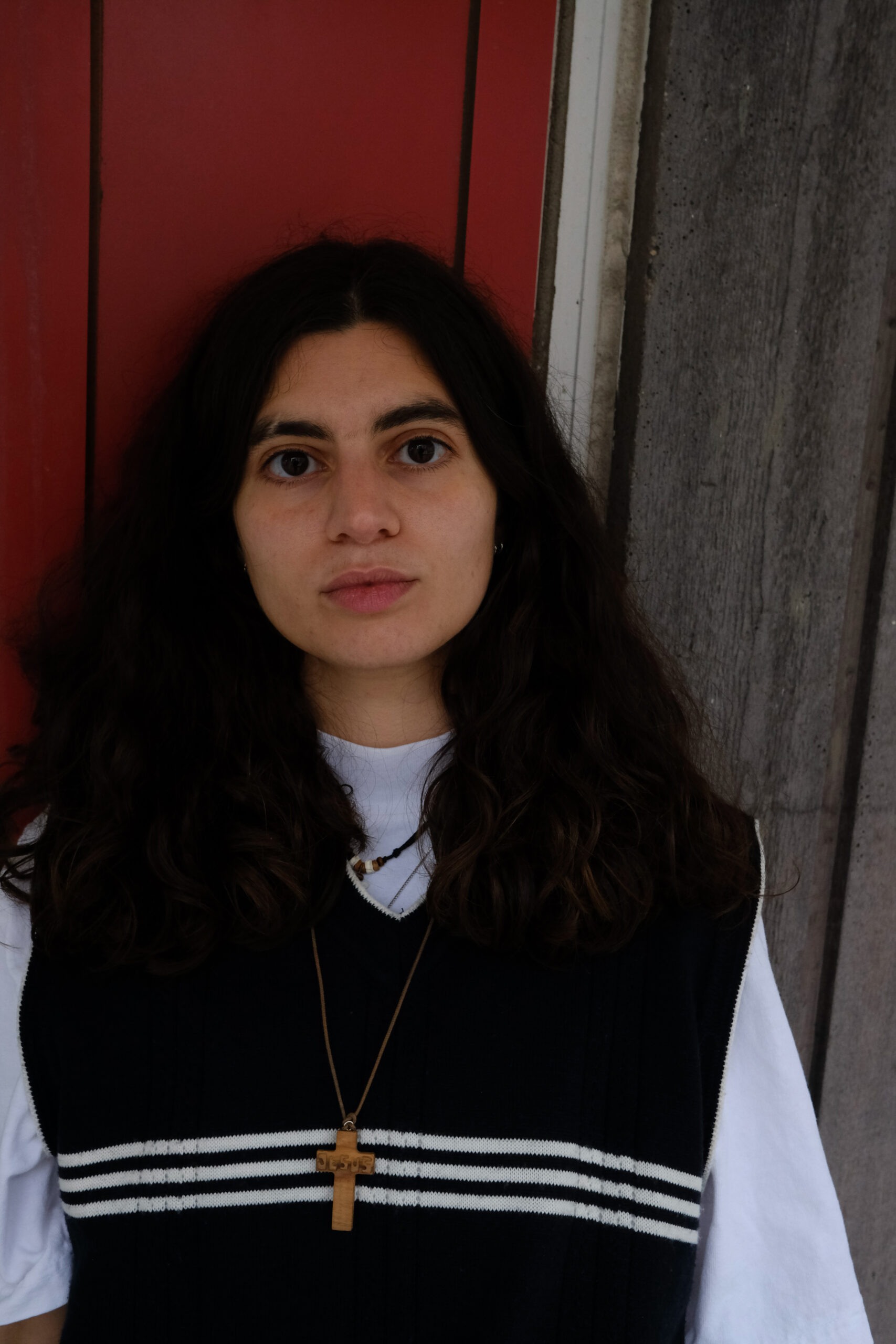I was barely a month into my undergraduate degree when Frank Bidart’s “Half-Light” appeared in the November 3, 2014 issue of The New Yorker. I remember staying up late at my desk, surrounded on all sides by those bare, white dorm room walls that speak of nothing. I listened to Bidart’s audio, then read that poem aloud over and over—
That crazy drunken night I
maneuvered you out into a field outside of
Coachella—
This poem begins with two lines whose enjambments (“I—”; “outside of—”) jolted me awake, as though “maneuvering” me likewise into the poem’s music. That first line, in particular, spotlights the speaking “I” before pushing past it, “out” over the line and “into a field”—drawing me, too, out into the white space of the page—then up to the sky and back down to the “dirt” the sky becomes.
I’d never seen a sky
so full of stars, as if the dirt of our lives
still were sprinkled with glistening
white shells from the ancient seabed
beneath us that receded long ago.
These next lines enact a subtle metamorphosis from sky to metaphorical dirt to literal soil “beneath us,” the bright sky suddenly a figure for the chaotic, shining expanse of the “dirt of our lives” before congealing into the fresh soil of the “parallel furrows” in the field where “we lay,” literalizing the metaphor and casting the past tense of memory against the “deep” ecological timescale of “the ancient seabed… that receded long ago.” The scene becomes a small, bright node on an almost unimaginatively long plot, both geological future (nature) and queer past (our natures). Having drawn the “I” and “you” of the first two lines into a single acting body, the poem’s lurching “we” lies down in the dirt, the shimmering substance of “our lives.”
Parallel. We lay in parallel furrows.
The miracle of these first four couplets—themselves “parallel furrows” on the open field of the page—is their vertiginousness: the kaleidoscopic changing of sky into dirt is imitated, sonically, by all that sibilance—“still were sprinkled with glistening white shells”—which glistens on the line like the ancient flecks of shell that spot the sky, the forms of our lives, the freshly-turned soil in the furrows. These lines both contain and render the speaking voice, which lies likewise in their “furrows.” The rhotic hums and soft tapping of the “t”-sounds of the “dirt” and “stars,” too, are “sprinkled” across these first couplets, creating something like an echoing effect at the level of the letter. The same kind of sonic gradient eventually manifests—up from those sibilant and rhotic sounds that make the “sky / so full of stars”—the soft puffs (of the lips) that make the “parallel furrows” and
—That suffocated, fearful
look on your face.
At the same time, the long “I” of the first-person pronoun that hung so trepidatiously at the edge of the first line transforms slowly into the sound of the long “e” that characterizes the first-person plural “we.” This transfiguration of sounds—from “I,” the “sky,” and “our lives” to “we” and the “seabed / beneath us”—also plays out by means of what I’m calling a sonic gradient that obsessively repeats and re-envisions itself, reverberating on the line. The long “I” that becomes the “sky,” “lives,” and the “white” shells in the dirt transmutes into its more sporadic sibling, the short “i” of the “as if,” which flickers in and out of earshot: “still were sprinkled with glistening.” The effect itself shimmers: the alteration between stresses (short “i”) and unstresses (uncolored schwa sounds) lulls the reader, for a moment, into a kind of glimmering, half-lit suspension, as if looking up at the stars from the furrows. Its final transformation into long “e,” which likewise flickers on the line—“the ancient seabed / beneath us that receded”—echoes aurally the collapse of the poem’s “I” into its “we.” The same way, a few stanzas later, the voice of Bidart’s “I” becomes that of Bidart’s “you.”
This vision of desire—to become the thing we love, to be remade in its image, to gradually take on its form—is the site of this poem, the mercurial “thing-that-is-struggling-into-existence” at its heart. In a 2015 article whose title contains its plea, its manifesto and its thesis—WE FILL PRE-EXISTING FORMS AND WHEN WE FILL THEM WE CHANGE THEM AND ARE CHANGED—Bidart describes the process of writing poetry in terms of being “gripped by something that struggle[s] to find existence through the medium of language, but whose source [is] not language”:
Trying to make a poem, one measures the thing-that-is-struggling-into-existence against the containers that the world, the history of art offer it for existence. Artists, poets ransack the world’s art for ways that art has been made, to increase their imagination of the forms that-which-is-within-them can begin to inhabit. By “forms” I mean not simply verse forms—a sonnet, a villanelle—but the shapes, styles, silhouettes, narratives, linguistic patterns, ways of making poems, ways of making meaning, that language and the world offer to organize the materials of a work of art. I say begin to inhabit, because… the forms inevitably change as the attempt is made to fill them.
All the affordances of the medium of language come together to realize the musical and narrative sequences of this poem, which taught me the fundamentals of rhythm and pacing. “Half-Light” is one of the first poems I memorized. It is a “pre-existing form,” as Bidart describes across his poetry and interviews, that I inhabit almost every time I try to write, mostly unbeknownst to my more conscious enterprises. It is a masterclass in what assonance and alliteration can do, both the voice’s vessel and its quickening elixir:
Jim, yesterday I heard your wife on the phone
tell me you died almost nine months ago.
Jim, now we cannot ever. Bitter
that we cannot ever have
the conversation that in
nature and alive we never had. Now not ever.
Bidart, in a 2013 interview with Poets and Writers, mentions that the first poem he committed to memory was Gerard Manley Hopkins’ “Pied Beauty.” “I always aspired in some way to emulate Hopkins,” he says. “Not that one can see many traces of Hopkins in my work.”
As I see it, this kind of sonic gradient is absolutely Hopkinsian, this kind of internal rhyme and obsessive orbit around a particular set of sounds (“cannot ever”/“bitter”/“cannot ever have”/“never had”/“not ever”), this kind of rhythm, semi-trochaic—in Hopkins’ terms, “rove over” (when feet are split by the line) “sprung” and “logaoedic” (speech-like, containing regular intervals between stresses). The vast field and sky of “Half-Light,” mottled and glinting, likewise recall Hopkins’ “skies of couple-colour,” which metamorphize into a “landscape plotted and pieced—fold, fallow, and plough” just like they do in the first few lines of “Half-Light,” whose very title means “dappled,” partly-lit. For Bidart, “Pied Beauty” is form he “fill[s]” and thus “change[s],” and by which he is “changed.”
We have not spoken in years. I thought
perhaps at ninety or a hundred, two
broken-down old men, we wouldn’t
give a damn, and find speech.
The admission of the end of the first line—“I”—becomes the admission of the poem’s third quarter, which—rising up from the past tense of memory—plays out in an unending lyric present:
When I tell you that all the years we were
undergraduates I was madly in love with you
you say you
knew. I say I knew you
knew. You say
There was no place in nature we could meet.
You say this as if you need me to
admit something. No place
in nature, given our natures.
We replay and relate the poems we read and they become versions of our own forms, affecting our rhythms and changing us from the inside. For Bidart, this line became a gravitational locus, a music he reforms and remediates throughout his career. “THERE WAS NO PLACE IN NATURE WE COULD MEET,” he says, voicing his mother in “Confessional,” a long poem in The Sacrifice (1983). “We couldn’t meet in Nature,— / …AND ALL WE HAD WAS NATURE.” Later, in “Whitman,” a poem about midway through Metaphysical Dog (2013), the argument becomes metapoetic: “A poem read aloud is by its nature a vision of its nature.” Finally, in the first poem of Thirst (2016), a new chapbook printed in the collected volume, Bidart’s “I”-speaker realizes, finally, that the space of the mirror “IS THE PLACE IN NATURE / WE CAN MEET,” a devastating revelation that, after forty years, has amassed an extraordinary multivocality, all its previous iterations ringing together in one voice. I “fill” and thus “change” the forms I encounter, and by them I am “changed” into them, seeing through and into them as in a mirror.
Or is this
warning? I say what is happening now is
happening only because one of us is
dead. You laugh and say, Or both of us!
As Chris Spaide points out, for The Yale Review, “Half-Light” is also, in a broader way, a revision: Bidart first depicts this scene in the eponymous poem of Star Dust (2005), which describes “that night / dense with date palms,” the “black sky thronging with light,” “we [lay] on our backs in close dark parallel furrows newly / dug.” Later, in “Like Lightning Across an Open Field,” the fourth poem in Watching the Spring Festival (2008), he narrates the process of obsessively writing and re-visioning this poem—“days and nights typing and retyping / revisions half in / relish because what you have / made is ill-made.”
“Each creature must / himself”, writes Bidart in “Whitman,” “grind the lens / through which he perceives the world.” We are made by the poems we memorize: we re-envision and refill their sounds every day, which “change” us as we remediate them, “chang[ing]” them in the process. They are the “voice of the bird you could not help but respond to” (“Like Lightning Across an Open Field”); they become part of the “voice in [our] head[s],” which says things like
LOVE IS THE DISTANCE BETWEEN YOU
AND WHAT YOU LOVE
WHAT YOU LOVE IS YOUR FATE (from “Guilty of Dust,” the last poem in In the Western Night, 1990)
and the “nature” of which is, like love, “not ever to release you” (“Whitman”). Bidart inherits an idea that can be traced back at least two millennia, installing him in a long line of mystical thought: that the nature of love is to transform the one who loves into the beloved. Likewise, what we read, repeat, and transcribe and thus recall and remake every time we sit down to write, those voices—they are our fate. They change us.
Our words
will be weirdly jolly.
That light I now envy
exists only on this page.




